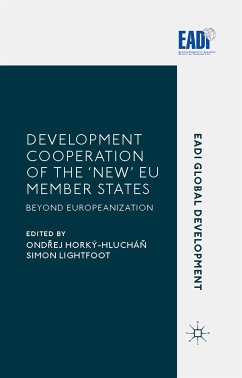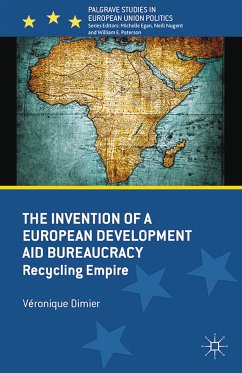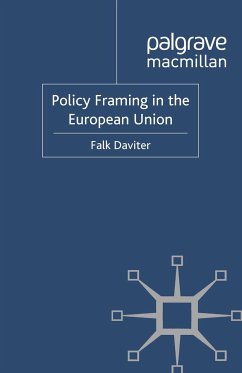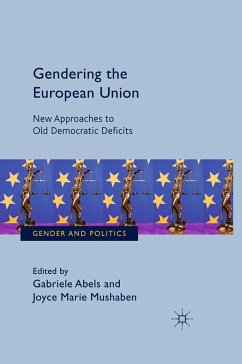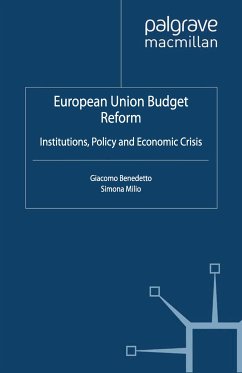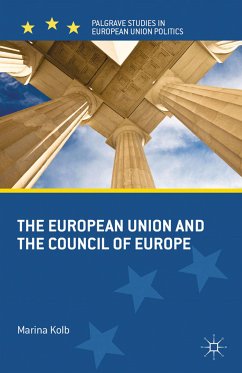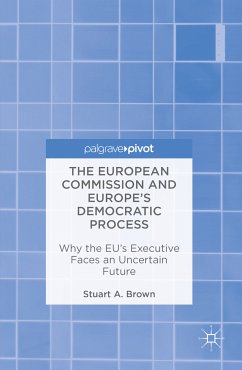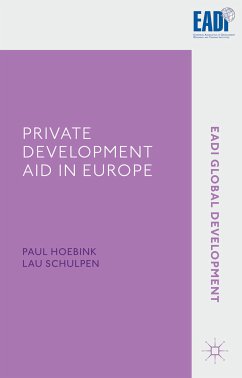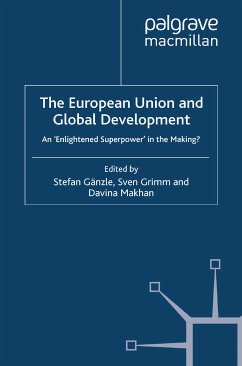
eBook, PDF
The European Union and Global Development (eBook, PDF)
An 'Enlightened Superpower' in the Making?
Redaktion: Gänzle, S.; Makhan, D.; Grimm, S.

PAYBACK Punkte
20 °P sammeln!






An assessment of the capacity of the EU to coordinate actors and policies with regards to global development. The authors argue that the EU and its member states have the potential to act for global development when they are able to improve policy and actor coherence, such as through better linking of bilateral and community programmes.
Dieser Download kann aus rechtlichen Gründen nur mit Rechnungsadresse in A, B, BG, CY, CZ, D, DK, EW, E, FIN, F, GR, HR, H, IRL, I, LT, L, LR, M, NL, PL, P, R, S, SLO, SK ausgeliefert werden.
STEFAN GÄNZLE Associate Professor, Department of Political Science and Management, University of Agder, Norway. He has been Researcher at the German Development Institute and DAAD Assistant Professor at the University of British Columbia, Canada. His research focuses on the intersection of regional integration and international relations, with emphasis on the European Union. SVEN GRIMM Director of the Centre for Chinese Studies, Stellenbosch University, South Africa. He was previously Research Fellow at the German Development Institute, where he led a multi-year project on European development cooperation, and at the Overseas Development Institute in London. DAVINA MAKHAN Capacity Development Officer, the New Partnership for Africa's Development (NEPAD) Planning and Coordinating Agency, based in Midrand, South Africa. Until 2011, she was a Researcher at the German Development Institute. Her research interests include trade and regional integration in Africa and in the European Union's trade and development policy. From 2005-08, she worked within the Economic and Trade cooperation programme of the European Centre for Development Policy Management in Maastricht.
Produktdetails
- Verlag: Palgrave Macmillan UK
- Seitenzahl: 305
- Erscheinungstermin: 17. April 2012
- Englisch
- ISBN-13: 9781137016737
- Artikelnr.: 45972262
'With The European Union and Global Development the editors and the various contributors have convincingly argued that development is not only about giving more and better aid, but is also about making a range of different policies more coherent. They have also successfully shown how a number of policy and institutional changes within the EU including the Treaty of Lisbon, as well as the emergence of new powers in the international arena - have affected the role of the EU in international development. For this, this book represents an excellent addition to the existing literature, and will be extremely useful for both scholars and practitioners in that it combines theoretically-informed analyses with excellent policy insights.'
-
-
Mehr anzeigen
Maurizio Carbone, Professor of International Development and Jean Monnet Professor of International Relations, University of Glasgow, UK
'This book is valuable in the sense that it gives new and deeper insight into a very important, albeit somewhat neglected, aspect of the European Union's policies for global development. It is a wide-ranging work, covering the main tenets and themes, while also synthesising the divergent strands into a very useful overarching context which students, in particular, will find very helpful. The book brings into new perspective the often neglected role of the EU as harbinger of a post-Westphalian new rule-based world order.'
- Gerrit Olivier, Honorary Professor in the Department of PoliticalSciences, University of Pretoria, South Africa
'The European Union and Global Development is a significant and timely contribution to the literature, which takes into account recent policy and institutional developments within the EU, as well as the shifting international context in which rising powers are playing an increasingly important role in global development policy. Contributors to this volume expertly and critically assess the EU's ability to formulate and implement coherent development policy and to have an actual impact on global development. Gänzle, Grimm and Makhan call for less rhetorical ambition and a more joined-up approach to development a call which EU policy-makers would do well to heed.'
- Karen E. Smith, Professor of International Relations, Director of European Foreign Policy Unit, Department of International Relations, London School of Economics and Political Science, UK
'This book is valuable in the sense that it gives new and deeper insight into a very important, albeit somewhat neglected, aspect of the European Union's policies for global development. It is a wide-ranging work, covering the main tenets and themes, while also synthesising the divergent strands into a very useful overarching context which students, in particular, will find very helpful. The book brings into new perspective the often neglected role of the EU as harbinger of a post-Westphalian new rule-based world order.'
- Gerrit Olivier, Honorary Professor in the Department of PoliticalSciences, University of Pretoria, South Africa
'The European Union and Global Development is a significant and timely contribution to the literature, which takes into account recent policy and institutional developments within the EU, as well as the shifting international context in which rising powers are playing an increasingly important role in global development policy. Contributors to this volume expertly and critically assess the EU's ability to formulate and implement coherent development policy and to have an actual impact on global development. Gänzle, Grimm and Makhan call for less rhetorical ambition and a more joined-up approach to development a call which EU policy-makers would do well to heed.'
- Karen E. Smith, Professor of International Relations, Director of European Foreign Policy Unit, Department of International Relations, London School of Economics and Political Science, UK
Schließen
Für dieses Produkt wurde noch keine Bewertung abgegeben. Wir würden uns sehr freuen, wenn du die erste Bewertung schreibst!
Eine Bewertung schreiben
Eine Bewertung schreiben
Andere Kunden interessierten sich für


